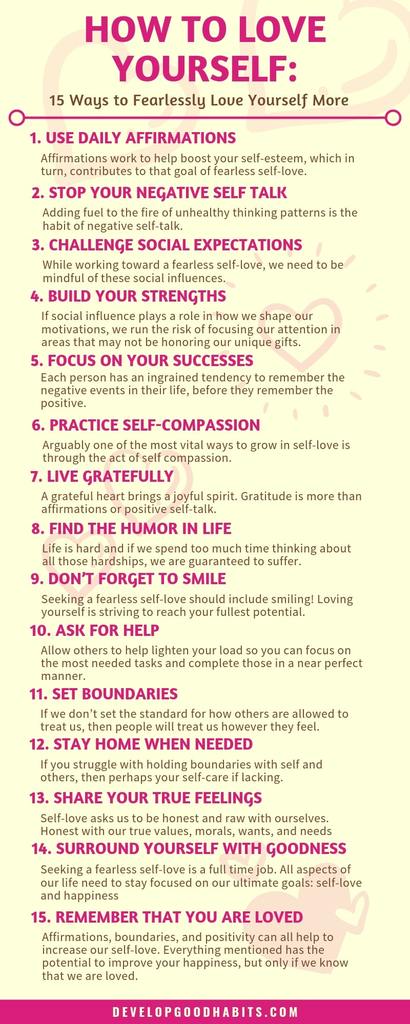Do you love yourself?
When you drag your butt out of bed in the morning are you energized to make the most of the day? Or are you worried about what will go wrong?
Do you look in the mirror and not like what you see? Or are you comfortable in your own skin?
Do you look forward to a bright future or do you fear future mistakes, pain, suffering, and regret?
If your answers are mostly positive, you likely love yourself. Good for you!
If your answers are more negative you really need to learn how to love yourself a bit more.
Learning how to love yourself is not about ego. It is not about narcissism. It is about opening yourself up to happiness and not blaming yourself for things outside of your control.
If you lack self-love, at least take comfort in the fact that you are not alone. Positive psychology studies show that 47% of American' s feel a low degree of self-love.
To put that in numbers – that is 165 million people (in the United States alone) who need to learn how to better love themselves.
That's a lot of people.
This article on how to love yourself will get you started on the road to increasing your happiness by loving yourself a bit more. It features 15 methods of increasing self-love.
Let's get to it…
Learning How to Love Yourself
Learning how to love yourself is no simple thing.
There is no “simple” single attitude that you can change to suddenly improve your self-love.
The two things studies have shown for sure is that you:
Many of the methods listed in the 15 ways to increase your self-love are designed to increase your confidence.
Confidence and self-love are not the same things. But they are closely related. Let's call them “kissing-cousins”.
Confident people can still lack self-love. But the studies show that the percent of confident people who lack self-love is far below the norm.
Therefore if you learn how to be confident, you will also be well on your way to learning how to love yourself.
Self-love is not found through external means.
Many of the world's most beautiful and important people secretly lack self-love. Celebrities are a great example of this. They seem so perfect and many people want to be just like them.
But they battle the same fears and anxieties as we do. Millions of fans who admire and respect you will not bring happiness. Only self-love will do that.
However, if happiness is not found through external means, where then do we begin?
To authentically seek happiness, we must go back to the pursuit of internal self-love. True and authentic happiness cannot begin unless it comes from love. Furthermore, love cannot occur unless we first love ourselves.
So that’s where we start. Self-love. A strong, passionate, fearless self-love. Self-Love that’s not simply SHOWING yourself love, but actually deeply and genuinely LOVING yourself.
I know that the concept of self-love can feel as ambiguous as happiness, so let’s consider some ways to begin our fearless self-love journey with the 15 methods of loving yourself more.

15 Ways to Love Yourself More
1. Use Daily Affirmations
Let’s start with affirmations. Affirmations are, essentially, self-paid compliments. Others may praise us, but to build authentic self-love we need to learn to self-praise.
Affirmations help us to acknowledge our own gifts, without relying on others to show us. Being able to embrace our strengths and goodness, without the approval of others, is the first step to fearless self-love.
If you’ve struggled with self-love in the past, learning to love yourself again, or to love yourself for the first time, can feel overwhelming and intimidating.
Affirmations are a gentle and excellent introduction to authentic self-love. Affirmations work to help boost your self-esteem, which in turn, contributes to that goal of fearless self-love.
Affirmations can be done in many ways and as often as you’d like. You can say affirmations to yourself in the mirror, you can write post-it notes and place them around the house, or you can say them to yourself in mind alone.
No matter your method, with time, affirmations will work to enhance your awareness of personal strengths, positive attributes and even help you achieve goals. Observing and accepting our innate strengths is the core of authentic self-love.
There is one important caveat to affirmations, though: just as the pursuit of happiness must be internal, so too must your affirmations.
If happiness sought through only external means is unattainable, so too is self-love sought only through external validations. Meaning, you want to focus your daily affirmations on your internal strengths and talents, rather than just external.
To foster fearless self-love, look for and affirm your internal strengths. Sure, praise your gorgeous face and compliment your successful career, but don’t stop there. Don’t forget that you are so much more than your beauty and your worldly success.
An authentic self-love is built from within. So, after you finish affirming your external attributes, don’t forget to affirm your kind heart, your forgiving nature, your resilient soul.
Those are internal strengths. Those are the qualities that make you authentic. Those are the traits that encompass who you are at your core and that is exactly who you want to love fearlessly.
2. Stop Your Negative Self Talk
Going hand in hand with affirmations is the practice of thought stopping, and in particular, working to discontinue negative self-talk.
Oftentimes we are our own worst enemy. We can be held prisoner in our own minds, but still forget that we can break free at any time, given the motivation and tools to do so.
Our thoughts can take us in multiple directions, both good and bad. For many, it feels natural and easy to assume the worst, over-analyze, jump to a conclusion, or even catastrophize.
These thinking errors are a trap for not only anxiety and low self-esteem, but also an inevitable cause of little self-love and unhappiness.
Adding fuel to the fire of unhealthy thinking patterns is the habit of negative self-talk. Speaking negatively of one’s self is a slippery slope. Perhaps it started as a simple self-deprecating joke, or an attempt to appear modest, but quickly turned into incessant self-degradation.
The hurtful and spiteful statements made in our own heads, toward ourselves, can wound more than any words spoken by another.
Yes, affirmations are a phenomenal tool for beginning self-love, but if you spend an equal amount of time criticizing yourself, the effects of affirmations become arguably insignificant.

So, taking a moment to reflect. If we are truly and honestly seeking self-love in the pursuit of happiness, can we afford to entertain those unhealthy thinking patterns?
No.
Fearless self-love abandons unhealthy thinking patterns and most certainly avoids negative self-talk.
We are our own worst enemies, but we are also our own best cheerleaders. No one, absolutely no one, can love you the way you can love yourself. So start supporting yourself and offer encouragement instead of discouragement.
Overcoming the negative self-talk hurdle can be as simple as replacing your negative thought with a positive. If you find yourself criticizing your weight, stop your thought and instead think of a positive attribute. Once you mastered this skill, your positive regard can be focused in all areas of life.
Since negative thinking patterns are not always as overt as a harsh critic, seeking fearless self-love requires constant vigilance for the avoidance of unhealthy thinking.
Work to avoid entertainment in stressful situations. Meaning, don’t allow your mind to gravitate toward stressful situations, hurtful people, or painful memories.
There is benefit in processing these issues, yet so often people remain stagnate in their pain, disallowing themselves the opportunity to heal and move on. Resulting, many people are in a constant state of mental angst.
Instead, seek that fearless self-love. Let go of the angst by processing your pain and allowing yourself to replace negative thoughts with positive, encouraging, and loving thoughts.
3. Challenge Social Expectations
Social influence is sneaky and powerful. How often do we find ourselves parroting the sentiments we hear in everyday life, from family, friends, or even marketing, without truly considering their implications or debating our honest feelings around such opinions?
Social influence can be positive, but when we experience the negative effects of social influence, our self-love and happiness can crumble.
Let’s consider some ways we’ve experienced social influence. Maybe we chose a certain hairstyle, clothing style, or even career, to feel as if we fit in with a certain group.
Perhaps family, friends, or society as a whole pushes a standard of which we know we don’t approve. Perhaps we’ve also been thrown into the trenches of unrealistic standards for self. These examples of social influence may seem harmless, but they set the stage for living inauthentically.
It’s well known that seeking the approval of others is a losing game. If we accept the unrealistic standards imposed on us by others, we risk causing a downward spiral of personal shame and self-loathing for not meeting that standard.

Furthermore, each time we alter our core desires to please others, we are slowly denying ourselves love and happiness.
While working toward fearless self-love, we need to be mindful of these social influences. Once we are aware of their existence, we can then begin to challenge them by living authentically.
Don’t fall into the comparison trap. Always seek self-approval over social approval. Don’t ascribe to an opinion that you don’t fully accept. Avoid agreement for the sake of appeasement.
Take time to determine your true values. Perhaps your values do align with social influences, but fearlessly loving oneself demands a life lived honestly and true to self.
4. Build Your Strengths
If social influence plays a role in how we shape our motivations, we run the risk of focusing our attention in areas that may not be honoring our unique gifts.
If we invest all our energy in the pursuit of one sport, one career, or even one life path, we need to ensure that those choices are aligned with not only our core beliefs and values but also our true strengths.
So often we work to build a talent that may not actually be meant for us. Society continually sends subliminal messages about what is the ideal life circumstance and how we should all strive to attain various aspects of that lifestyle, including which sports to play and careers to choose.
Perhaps, though, our true self would be unhappy if those life circumstances were actualized.
Each person is special and unique in their wants and desires, as well as their personal strengths. Each person holds different values of what makes life whole and content. Yet, society insists that each person and their want, goals, talents are the same as others. This is simply not true.
Striving toward fearless self-love asks you to take a personal inventory of not only your true wants but also your true talents. One sport or activity may be popular in your school or family, but perhaps your greater talent is found in a different area.
There is certainly no harm in practicing to build certain talents. In fact, doing so can be argued as vitreous, if the talent pursued is virtuous. However, be sure to devote as much, and ideally more, time to fostering those strengths that are unique to you.
If you’ve practiced football, but find that you’re better at baseball, then focus your energy in baseball.
If you’ve worked to pursue a career in the sciences, but find your strengths are in mathematics, then consider taking the step toward a career in mathematics. Loving ourselves fearlessly means fostering our individual strengths to increase our self-worth and honor our gifts.
Pursuing our own talents is crucial for self-love, as self-love asks us to love ourselves. Loving our true selves means loving our true talents. If we don’t engage those talents our true self will diminish.
When you start to wonder how to love yourself better, you need to remind yourself of your strength. Perhaps make it a self-care exercise to write down 10 strengths each and every week in a journal. You can also ask self-reflection questions to understand yourself better.
5. Focus on Your Successes
Each person has an ingrained tendency to remember the negative events in their life before they remember the positive. This tendency is actually biological.
Centuries ago, before modern civilization, man had to defend himself against wild animals and natural disasters. Living in such a vulnerable time created constant alertness, one focused on listening for and assuming the worst, in order to prepare oneself for battle.
It worked as a form of self-protection and, at that time, it served man well. Thanks to the negativity bias, our species was able to survive those tumultuous decades.
Here we are now in the 21st century, where our concerns are far different than cave times. We are no longer living among wild animals that could harm us, nor are we at the mercy of mother nature.
We have homes to protect us, firearms to defend us, and several other modern-day accouterments that allow for a lower level of immediate danger.
That negativity bias stuck with us, though. Through generations of man, and millennia of industrialization, our tendency to function at high alert, and to assume the worst, has stayed in our core.
This negativity bias becomes most evident as we take steps toward self-love.
How often do we remember the negative things we’ve done, before the positive?
How quick are we to criticize rather than praise?
Are we still assuming the worst is coming as if our minor flaws are putting us at risk of immediate danger?
If you find yourself reflecting more on your imperfections than your successes, working to retrain your mind will prove essential for seeking self-love.
When you find yourself ruminating on past mistakes or find yourself in difficult situations, take a moment to use self-empowerment tools. Remind yourself that you overcame the past and will overcome the present challenge as well.
What if you haven’t overcome the past difficulty, or you find it lingering in some or all areas of your life? Take some time to reflect on the difficulty and see if there is potential to learn from the negative experience.
Perhaps you locked your keys in the car or maybe you were reprimanded at work. These experiences feel hurtful and often lead to a sense of shame, but they offer an opportunity for improvement.
Working to view the seemingly negative experiences as opportunities with growth and celebrating wins, big or small, will promote a growth mindset, ultimately leading to more positivity and self-love.
6. Practice Self-Compassion
Arguably one of the most vital ways to grow in self-love is through the act of self-compassion. We cannot truly love ourselves if we deny ourselves forgiveness and compassion for being human.
Yes, being human brings flaws. You’re not alone in your struggles. Yet, despite those struggles, it is imperative that we allow room for self-compassion.
Our inherent value is not dependent upon our worldly success, perfect homes, or even emotional regulation. We have value by virtue of being human. Knowing this, we should then offer grace and charity to ourselves when we struggle; especially when we struggle.
We’ve already addressed how the comparison trap damages our self-love, and that damage still occurs even when comparing struggles. We all struggle in different areas.
Some struggles may appear larger than others, but there is by no means a hierarchy of difficulties. One person may appear to have a worse struggle, yet their struggle does not diminish the pain you are experiencing from your own struggles.
Attempting to comfort yourself by playing the “it could be worse” game, is actually criticism masquerading as healthy coping.
By playing this game, you’re denying yourself your own feelings and, in a sense, insulting yourself for feeling hurt at all. Simply because someone “has it worse” does not mean the pain you feel is inappropriate.
Moving toward fearless self-love means accepting our emotions and allowing room for self-compassion. Allow yourself space and freedom to experience your human emotions, both good and bad.
If you feel hurt by a situation, then allow yourself to feel hurt. If you feel happy about an event, then absolutely allow yourself to feel happy.
It takes courage to love ourselves, both good and bad. It takes bravery to offer ourselves compassion when we’ve spent years criticize ourselves. Working toward our goal of fearless self-love, it would then make sense to incorporate such courageous and brave acts of self-compassion.
7. Live Gratefully
A grateful heart brings a joyful spirit. Gratitude is more than affirmations or positive self-talk. Gratitude is a way of experiencing our world and the opportunities in that world.
Echoing similar sentiments from above, when our minds are hyper-focused on the negative, we risk a continual release of cortisol from perpetual stress.
Chronic stress can lead to anxiety, disordered emotions, and depression. All of these are unhealthy emotional states that can benefit from professional treatment.
A technique used by many mental health professionals as a starting point for coping with stress, emotional dysregulation, or depression, is the practice of gratitude.
This practice helps to retrain your mind to see and accept the positive in daily life, as well as appreciate life’s blessings and the kindness offered and received by others.
Implementing a gratitude practice won’t immediately cure emotional ailments, but it will begin to mitigate our stress and help us to break down more barriers to self-love. This is an important key to how to love yourself.
Working to implement gratitude may seem uncomfortable, especially if the concept is unfamiliar to your lifestyle. If you relate to that sentiment, starting with a week-long gratitude challenge can be a nice way to ease into things.
Each day, list three things for which you are thankful. They can range anywhere from “coffee” to “loving relationships.” Start wherever you feel comfortable and as you continue your gratitude challenge you might notice an increased level of thankfulness and happiness.
Now, an important part to a gratitude challenge is to always be grateful for self or something self-created. Meaning, don’t be afraid to list your positive attributes as things for which to be grateful.
There is no shame in being grateful for your bravery and how it helped you to choose to go out by yourself. Perhaps that decision allowed you some much-needed self-care, resulting in a more positive day.
Sometimes we worry that praises self will appear haughty, but don’t allow that fear to keep you from praising your innate goodness. Love yourself and your goodness and the qualities that stem from it.
Watch the video below to discover the 9 best gratitude apps that can help with a gratitude journaling practice or as a simple tool to remember this important habit.
8. Find the Humor in Life
Life is hard and if we spend too much time thinking about all those hardships, we are guaranteed to suffer. Humor is an excellent coping skill, and one of the top 54 ways to find happiness in your life.
Humor, if used appropriately and not as a tool to mask and stifle emotions, allows us to de-stress and provides an opportunity to practice self love.
When we spend our days with a stoic demeanor, we are closed off to the humorous experiences in daily life. Furthermore, remaining stern creates a type of rigidity in mind and body, which risks emotional distance from self.
Fearless self-love and happiness stem from connection to self, by extension then, we should allow for as much emotional space as possible in order to make such connections.

Now, having a sense of humor in life does not automatically correlate to self-connection, but it does allow a greater chance of that occurring.
When we use humor as a positive coping skill, we are allowing ourselves to overcome our rigidity, increase reflexive thinking and improve our ability to see the positive side of various situations, even if small.
Finding humor in times of suffering is not to say we should joke about serious matters. Humor is certainly not appropriate for all situations and can be inappropriate if used too quickly.
That being said, if time has been allowed for the processing of emotions and grief, humor can be used as a chance to move forward in life and continue coping.
Consider, for example, the risk of losing your car keys at a festival. You spend hours looking for your keys and then eventually abandon all hope, choosing to ride home in a taxi instead. You are then forced to buy new keys to go back and retrieve your car.
Immediately, this situation would provoke frustration, sadness, or anger. A few days later, however, this might prove a great opportunity to use humor as a coping skill. It’s a rather comical story that can also provide a moment for learning to keep keys close at hand.
Seeing humor in this situation allows for a decrease in stoicism and rigidity, by allowing yourself to admit your human faults and therefore connect with yourself.
Acknowledging your humanity and mistakes in a loving way honors who you are at your core. Being able to find humor in difficult moments and mistakes allows for greater self-love, as it loves the truth of your being.
9. Don’t Forget to Smile
We now know that humor and laughter are excellent coping skills and steps toward self-love, so how about smiling?
We know that the moods of others can impact our mood. If you’re having a rough day, chances are that others in your immediate family will unknowingly adapt their mood to match yours. Resulting from this, the whole house could soon be unhappy.
If we can adopt the negative moods of others, the same must also hold true for happiness. Have you ever been around people who are smiling and laughing and found it difficult to not join them?
When surrounded by smiles and laughter, many people find themselves adopting the mood and experiencing happiness themselves. Smiles and laughter are contagious!
If, however, you’re struggling with anxiety, depression, or low self-esteem, smiling may seem a daunting task. Ironically, that is exactly why encouraging yourself to smile could be one of the best things for you.
Science has shown that smiling can improve mood. Based on these studies, if you force yourself to smile for a few minutes straight, your mood will likely improve. Smiling isn’t just magic, there’s actually a chemical reaction occurring in your brain that alters your emotional state.
With each smile, your body is releasing Dopamine and Serotonin, or the “feel good” hormones. Dopamine increases happiness and Serotonin decreases stress.
Remember Cortisol and its negative impact on your mood? These two hormones work to combat the negative effects of Cortisol and improve overall wellbeing.
With these two powerful neurotransmitters, our seemingly insignificant smile can decrease stress, improve depression symptoms, and boost your immune strength.
Seeking fearless self-love should include smiling! Loving yourself is striving to reach your fullest potential. Smiling won’t resolve all internal conflicts, but it certainly offers an amazing starting point!
So, go ahead and smile, even laugh if you’d like! Bravely wear that smile and see how it improves your day!
10. Ask for Help
Our culture is individualized, which can have many positives.
Yet, when taken too far individualization can become isolating and overwhelming. If you have experienced the negative side of individualization, then asking for help may seem inappropriate or unrealistic.
The irony is that not asking for help is the part that’s unrealistic. We as humans are meant for community, it is ingrained in our DNA, yet we fight against that drive and insist on working alone. There are many things we can accomplish by ourselves, but not everything.
We are overworked, overstressed, and overtired. Each to those alone makes for challenging days, but when combined, our stress inevitably rises. This stress may lead to feeling overwhelmed or even create a sense of failure, yet we may still struggle to ask for help.
If you want to know how to love yourself, you will also need to learn how to ask for help.
How often do our friends and family encourage us to ask for help? How many times have we had someone remind us that they are just around the corner, or just a phone call away, but we rarely take them up on their offers?
Perhaps we are even the ones offering to help. It’s not unusual for us to be kind and encouraging toward others, without offering ourselves the same grace.
Take time to reflect on possible reasons you struggle to ask for help. Maybe you feel like a burden to others and are fearful that their offers were perfunctory and disingenuous. Perhaps your confidence insists you can manage more than humanly possible.
No matter the reason for not asking for help, a pursuit of fearless self-love requires bravery and moving in the direction of accepting help.
Practice your affirmations and remind yourself that you are not a burden. Find your courage and make that phone call to family and friends. Forgive yourself for not meeting an unattainable standard of perfection.
Allow others to help lighten your load so you can focus on the most needed tasks and complete those in a near-perfect manner.
Love yourself enough to ask for help.

11. Set Boundaries
Do you respect yourself? A lack of boundaries invites a lack of respect. People treat us the way that we allow. If we don’t set the standard for how others are allowed to treat us, then people will treat us however they feel.
Setting boundaries is essential to a healthy relationship with others and with self. Boundaries are a necessary filter for what we allow in our lives. Boundaries are physical, emotional, and mental. Boundaries keep us safe.
Self-love requires boundaries because loving self means surrounding yourself with love. Boundaries ensure that we love ourselves enough to be around those who respect and care for us.
If we lack boundaries or struggle to maintain boundaries, we risk spending time with people who are unhealthy for our being. Sometimes we set boundaries, yet others violate those boundaries. Perhaps we then forgive the violation and return to those who hurt us.
Those who violate our boundaries are not respecting who we are and can possibly diminish our sense of self-worth, or eventually dull our self-love and happiness. Be certain to hold firm in your boundaries, especially when dealing with truly toxic individuals.
Boundaries are necessary for self, as well as with others. Boundaries with self include personal restrictions in areas of struggle. Perhaps your personal struggle is television. You want to limit your television watching, so you set a boundary with yourself to only watch two hours a day.
Holding this personal boundary will not only improve self-control but also improve self-esteem and overall functioning as you begin to engage a healthier lifestyle.
Setting boundaries with others and with self-serve as a component for self-love. Establishing a boundary is noting your self-worth and value and holding firm that to the boundary is daily proving your worthiness.
Self-love grows with healthy boundaries.
12. Stay Home When Needed
If you struggle with holding boundaries with self and others, then perhaps your self-care if lacking. (Here are some self-care ideas to try out.) Perhaps you find yourself worried about other’s emotions before your own.
Maybe this translates into putting the needs of others before yourself, pushing your own needs into the background.
You are not responsible for other’s emotions. I’m not saying we shouldn’t take care and concern for others and work to help others when needed. I’m also not saying we can be discourteous and disregard the options of others altogether.
I am saying that we are not responsible for other’s emotions. I am saying that you should not feel expected to continually neglect your needs to ensure others feel content.
If you want to stay home for the night, rather than join a friend for the evening, then, by all means, stay home. If you need that introvert time and want to join your friends another night, then go ahead. There is nothing selfish about wanting time to recover.
If your friends feel upset about your decision, then simply remind yourself that you are not responsible for their feelings. They can certainly feel angry if they would like, but it is not your job to help them manage their disappointments.
Hold firm on your boundaries and don’t waiver in personal needs to keep someone else happy. Your happiness comes first.
The race toward fearless self-love may seem selfish at times. But remember that loving yourself is key in human relationships. Learning how to be selfless is also an act of self-care. You can only love others if you first love yourself.
Take a night off to foster self-love, then meet your friends later to share your loving nature.
13. Share Your True Feelings
Self-love asks us to be honest and raw with ourselves. Honest with our true values, morals, wants, and needs. Honest with our deepest secrets and fears. Honest with our true feelings.
So often people struggle most with accepting and processing their emotions. Human emotions can be such a beautiful part of humanity, yet they can also be the most painful part. Yet, if we want to fearlessly love ourselves, we must accept our emotions as they lie at the core of our being.
Do you find yourself naturally guarded with your emotions? Not simply with others, but with self? Do you stifle your own emotions to the point of being unable to experience various feelings?
Self-love asks us to overcome these barriers. Assess yourself multiple times daily.
How are you feeling?
Was there anything in particular that caused the current emotion and how can we process that emotion in a healthy manner?
Furthermore, what do we need for self-right now?
Do we need to say no or yes to the current situation?
Learning our own emotions can take time, especially if we’ve spent years ignoring them.
Be mindful, however, that unless we know our true feelings, we are unable to fully connect with self. If self-love is what we are seeking, learning, accepting, and processing our emotions is a must.

14. Surround Yourself with Goodness
Seeking fearless self-love is a full-time job. All aspects of our life need to stay focused on our ultimate goals: self-love and happiness.
This doesn’t mean overthinking and overanalyzing every thought or action, but it does mean we should be intentional about your daily activities.
It’s not unusual for people to thrive on stress. If you’ve been raised or live in a stressful environment your body will adapt to the cortisone and begin to experience stress as a baseline, or normal, functioning.
Although we may feel okay most days, functioning in a constant state of anxiety is not healthy. We should want to improve that baseline to one of less stress.
Surrounding ourselves with goodness helps to limit our stress and retrain our brains to search for a life that is filled with happiness. Read positive books, listen to calming and encouraging music. Stay close to positive people and partake in positive experiences.
A life filled with goodness will lead to a mind more positive mindset. Intentionally seek happiness and soak it up. Fearlessly love yourself by choosing what brings you joy.
[Want some inspiration to increase your self-love? Check out these self inspirational quotes to inspire you to have more faith in yourself and your abilities]
15. Remember That You are Loved
Affirmations, boundaries, and positivity can all help to increase our self-love. Everything mentioned has the potential to improve your happiness, but only if we know that we are loved.
Knowing we are loved, reminds us that we are worthy of love. We are worthy of accepting love from others and we are absolutely worthy of offering love to ourselves.
Remember that there are people in your life that delight in your presence, that feel joy when you call. Remind yourself of those people who support you on your bad days as well as your good, because you are loved.
When your negativity bias creeps back into your mind, remember that you are loved and worthy of a brave, empowering, and fearless self-love.
[Want more tips for loving yourself? Check out this list of 13 more unique ideas for loving yourself]
Top 5 How to Love Yourself Books
This article shows you 15 basic steps of how to love yourself. If you follow these steps, it will be all you need to greatly increase your self-love.
But let's face it. Motivation wanes with time.
A week from now you may forget many of the steps in this article and fall back into old patterns. That is why reading a lot about a topic helps you to increase your chances of success. Because it keeps the idea fresh in your mind until the changes become habits.
This list of the top 5 self-love books are a great place to start finding out more details about loving yourself.
The Self-Love Experiment by Shannon Kaiser
Choose Yourself! by James Altucher
Girl, Wash Your Face by Rachel Hollis
Radical Self-Love by Gala Darling
You Are a Badass by Jen Sincero
Learn to Love Yourself First: Quotes for Self-Love
A final section I would like to share a few of the best quotes about loving yourself. While quotes are not going to make or break your success with increasing your self-love, it is always nice to get a little bit of inspiration.
Final Thoughts on How to Love Yourself
Are you still feeling defeated and confused, or has this helped you to feel impassioned and ready to begin anew?
Hopefully knowing that others struggle in all the same areas brings comfort and with luck, a sense of empowerment comes from knowing that many of these universal struggles are overcome.
We all want happiness and seeking happiness in life is possible. There are many ways we can search for happiness; however, self-love serves as a primary means of finding happiness. Without internal love, we cannot love others and happiness might seem a mythical idea.
Consider beginning these techniques. Start small and work toward the larger ones. Don’t be ashamed if you haven’t reached full self-love and happiness after a few months or even a year. Don’t create more stress by working too hard to destress.
Learning to love is a process and be sure to offer yourself grace and patience. Most of all, however, be certain to always remember that you are loved.
And if you're looking for more resources to help you love yourself more, be sure to read these articles:
- 41 Songs About Loving Yourself for Who You Are
- 77 Self-Care Quotes to Love Yourself More
- 12 Ways to Be Yourself in Uncomfortable Situations








Great post! In our fast-paced world where clear boundaries become more muddled, we need more information like this! You need to take care of yourself first.
Such a great Article. The tips are really fun to read with and are helpful. Thank you so much for reminding us that we are loved. A lot of people forget that. And part of loving ourselves is to remind ourselves that we are not alone and we are surrounded by the people we loved.
Being grateful seems to help a lot!
I think that a lot of unhappiness stems from comparing ourselves to others.
And we do so because we want to chase after and own things that we don’t have.
To me, being grateful reminds me that I have a lot of awesome things going on in my life and that I don’t need anything more to be happy.
So I try to practice some form of gratitude daily!
So many nuggets of truth in here! Your point about social expectations being sneaky and powerful is a good one. I am realizing now, in my early 30’s, how I’ve planned my life around social expectations… without even realizing it. Thank you for these ideas — I look forward to applying them!